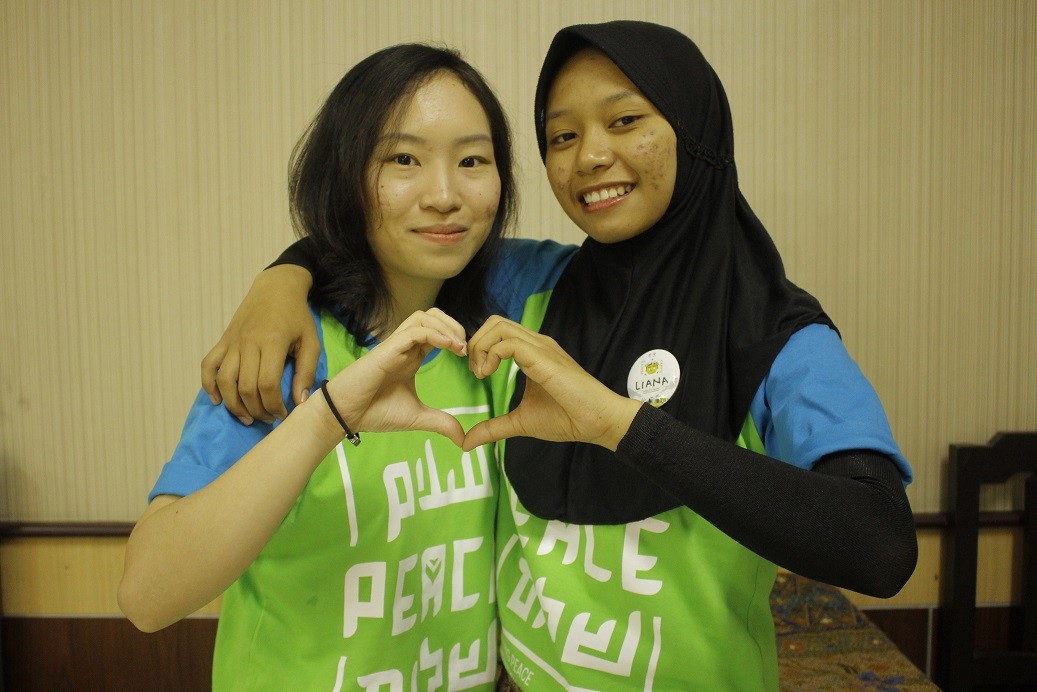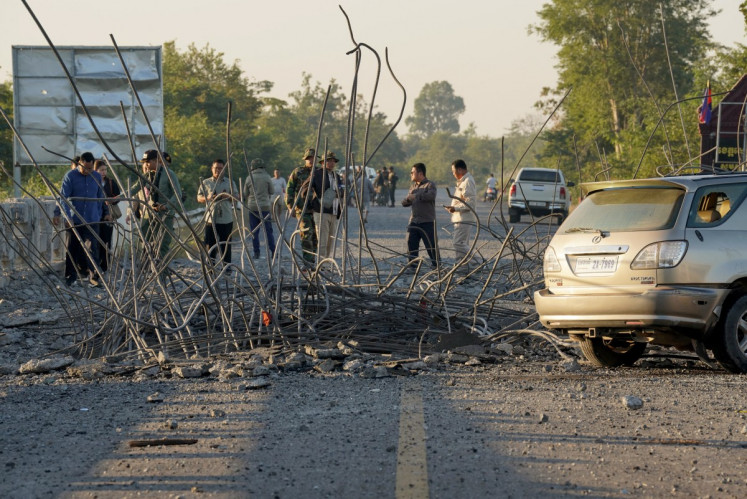Popular Reads
Top Results
Can't find what you're looking for?
View all search resultsPopular Reads
Top Results
Can't find what you're looking for?
View all search resultsPeace warriors assemble!: Youth unite to tackle growing intolerance in Indonesia
Oktavia Rahmawati, a Muslim teen, used to think that all Christians were cruel and arrogant. That was until she got the chance to spend time with them at an interfaith forum in September.
Change text size
Gift Premium Articles
to Anyone
 New friends: Michele (left), a Christian, and Liana Lukita Furi, a Muslim, pose during an interfaith camp organized by Young Interfaith Peacemaker Community Indonesia (YIPC) from Oct. 18 to 20 in Surabaya, East Java. Since 2012, YIPC has conducted peace camps in six cities, including Jakarta and Surabaya, to tackle growing intolerance in Indonesian society. (-/JARING)
New friends: Michele (left), a Christian, and Liana Lukita Furi, a Muslim, pose during an interfaith camp organized by Young Interfaith Peacemaker Community Indonesia (YIPC) from Oct. 18 to 20 in Surabaya, East Java. Since 2012, YIPC has conducted peace camps in six cities, including Jakarta and Surabaya, to tackle growing intolerance in Indonesian society. (-/JARING)
F
acing growing intolerance in Indonesia, young people have started initiatives to promote tolerance. The Jakarta Post, Bandung-based daily Pikiran Rakyat and the Indonesian Network for Investigative Journalism (JARING) look closer at these efforts to create a pluralistic and peaceful society.
Oktavia Rahmawati, a Muslim teen, used to think that all Christians were cruel and arrogant. That was until she got the chance to spend time with them at an interfaith forum in September.
The 19-year-old girl was raised in a Muslim family in the predominantly Muslim society of Bandung, West Java. Oktavia spent most of her childhood attending Islamic boarding schools before enrolling in the State Islamic University (UIN) Sunan Gunung Djati in Bandung.
She barely interacted with people of other faiths. Her image of Christians was shaped primarily by soap operas, which often portrayed them as the rich “who like to oppress the poor ones".
She drastically changed her view after participating in an interfaith youth camp from Sept. 13 to 15 in Megamendung, Bogor, West Java.
The camp invited 27 young people – 18 Muslims and 9 Catholics – to open themselves up to others and engage in inter-religious discussions to clarify the perspectives they had about other religions.
Oktavia initially intended to use the forum to explain to her Christian peers that Muslims were not terrorists like some people believed. But by the end, the forum had helped her break down her own prejudice about Christians.
"I used to think all Christians were distant, but it turns out they warmly welcome us, the Muslim participants,” she said.
The camp was organized by Sahabat Sophie, an interfaith community under the Society of the Sacred Heart (RSCJ) – a Roman Catholic congregation.
Sahabat Sophie adviser Lulud suggested that many Indonesians were consumed by propaganda and prejudice that made them hate or discriminate against people of different beliefs.
“We're deeply saddened by the growing intolerance in our society. We ask ourselves, ‘What can we do to address this matter?’” Lulud said.
Sahabat Sophie faced challenges, according to Lulud, in inviting participants from various religious backgrounds. They only managed to gather Muslims and Catholics, but they went on with the plan, hoping it could bring positive changes, even if they were small.
Religious freedom watchdog Wahid Foundation has recorded a growing number of violations of religious freedom in Indonesia, from 265 cases in 2017 to 275 cases in 2018.
Wahid Foundation executive director Mujtaba Hamdi said intolerant acts surged particularly after the divisive 2017 Jakarta gubernatorial election and the recent presidential election where "religions were politicized".
The politicization of religion, he said, appeared to give room for religious intolerance to grow even bigger.
"We definitely need to initiate more interfaith activities and make sure they are sustainable," Mujtaba added.
Many interfaith initiatives in Indonesia involve or are started by young people.
For example, in the Muslim-dominated city of Bandung in West Java, where violations against minority groups' religious freedoms often occur, a group of young people founded interfaith network Jakatarub in 2002.
Jakatarub initially provided tours of the places of worship of different religions. In 2015, the network started hosting interfaith camps.
The three-day camp, held annually, invites secondary school and university students from various religious backgrounds, including those from minority Muslim groups Ahmadiyah and Shia.
In addition to facilitating interfaith dialogues, the camp equips participants with skills to spread tolerance at home, such as filmmaking.
"The test actually begins right after the participants return to their own communities – whether they can spread the tolerance-value afterward," Jakartarub coordinator Wawan Gunawan said.
One of the camp’s alumni, Asifa Khoirunnisa, set up her own inter-religious network in the eastern part of Bandung, called Salim. One of its events was a discussion with Ahmadiyahs, who are widely persecuted by the Muslim majority.
Jakatarub's camps have also inspired the establishment of at least seven other interfaith communities: Gradasi, Koin, Pelita, KPL, Fopulis, Koran Rolek and Tabib. They are spread across seven cities and regencies in West Java.
Aside from Jakatarub, there is also Young Interfaith Peacemaker Community Indonesia (YIPC), which regularly holds “peace camps” in five cities in Java and also in Medan, North Sumatra
Since its founding in 2012, YIPAC has organized 53 peace camps which have involved 1,590 young people.









